Maintaining a clog-free shower drain is essential for preventing blockages and ensuring smooth water flow. Regular care prevents hair‚ soap scum‚ and grease buildup‚ promoting a clean and functional bathroom environment.
Why Regular Maintenance is Essential
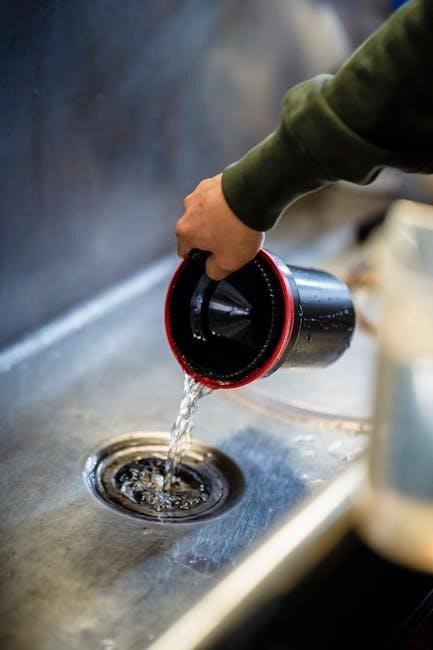
Regular maintenance is crucial to prevent clogs and ensure smooth water flow. Hair‚ soap scum‚ and grease buildup can lead to blockages‚ causing water backups‚ mold growth‚ and unpleasant odors. Neglecting maintenance can result in costly repairs and potential water damage. Consistent upkeep prevents these issues‚ reduces the need for harsh chemicals‚ and extends the lifespan of your plumbing system. A well-maintained drain not only improves hygiene but also saves time and money in the long run.
Common Causes of Shower Drain Clogs
Shower drain clogs often result from hair accumulation‚ soap scum buildup‚ and grease deposits. Hair‚ especially after shaving‚ entangles and traps debris‚ creating blockages. Soap scum and oil residue coat pipes‚ narrowing water flow paths. Foreign objects like beads or jewelry can also obstruct drains. These elements combine over time‚ leading to slow drainage and potential backups. Addressing these issues early prevents severe clogs and maintains a smoothly functioning drainage system for a cleaner‚ more hygienic bathroom environment;
Benefits of a Clog-Free Shower Drain
A clog-free shower drain ensures smooth water flow‚ preventing backups and water damage. It reduces unpleasant odors and promotes a cleaner bathroom environment. Regular maintenance saves time and money by avoiding costly repairs. A well-maintained drain also extends the lifespan of plumbing systems‚ offering peace of mind and enhancing overall hygiene. Additionally‚ it prevents the growth of mold and mildew‚ contributing to a healthier living space. A clog-free drain is essential for a functional and hygienic bathroom experience.

Understanding the Problem: Common Shower Drain Clog Culprits
Hair‚ soap scum‚ grease‚ and foreign objects are the primary causes of shower drain clogs‚ leading to slow drainage and potential water backups if left unaddressed.
Hair Accumulation in the Drain
Hair accumulation is a leading cause of shower drain clogs. Strands of hair often bind together‚ forming a thick mass that traps other debris like soap residue and grease. Regularly removing hair after showers significantly reduces clog risks. Using a drain strainer or catcher can effectively catch loose hairs before they enter the drain. Prompt cleaning and maintenance are crucial to prevent hair buildup from escalating into a stubborn blockage. Addressing this issue early ensures smooth water flow and a well-functioning shower drain system.
Soap Scum and Residue Buildup
Soap scum and residue buildup in shower drains is a common issue‚ as these substances create a sticky layer that traps hair‚ grease‚ and other debris. Over time‚ this accumulation narrows the drain’s passageway‚ slowing water flow and leading to clogs. Regular cleaning with natural solutions like baking soda and vinegar can dissolve and remove these residues‚ preventing blockages. Addressing soap scum proactively helps maintain a clog-free drain and ensures optimal plumbing performance.
Grease and Oil Deposits
Grease and oil deposits are notorious for causing stubborn clogs in shower drains. These substances harden upon cooling‚ adhering to pipe walls and trapping debris. Over time‚ this buildup restricts water flow and leads to complete blockages. To prevent this‚ avoid pouring grease down the drain and consider using enzymatic cleaners to break down organic matter. Regular maintenance with natural solutions like baking soda and vinegar can also help dissolve grease‚ keeping your shower drain flowing smoothly and clog-free.
Foreign Objects and Debris
Foreign objects and debris often find their way into shower drains‚ causing unexpected clogs. Items like coins‚ jewelry‚ or small toys can accidentally fall into the drain‚ leading to blockages. To prevent this‚ install a drain strainer or hair catcher to trap larger particles. Regularly inspect and clean the drain to remove any accumulated debris. Being mindful of what goes down the drain significantly reduces the risk of clogs and ensures smooth water flow‚ maintaining a clog-free shower drain.

Preventive Measures for a Clog-Free Shower Drain
Installing a drain strainer and avoiding grease or oil can prevent clogs. Regular cleaning and mindful use ensure smooth water flow and a well-maintained shower drain system.
Using a Drain Strainer or Hair Catcher
A drain strainer or hair catcher is an effective tool for preventing clogs. It traps hair‚ soap residue‚ and debris before they enter the drain. Regularly clean the strainer to maintain its efficiency. This simple addition reduces the risk of blockages and ensures smooth water flow. By catching contaminants early‚ it promotes a clog-free shower drain and extends the lifespan of your plumbing system. It’s a cost-effective and easy-to-install solution for daily maintenance.
Avoiding Grease and Oil in the Drain
Grease and oil are common culprits behind clogged drains. These substances solidify inside pipes‚ creating stubborn blockages. To maintain a clog-free shower drain‚ avoid pouring grease‚ cooking oil‚ or fat down the drain. Instead‚ dispose of them in sealed containers or through appropriate waste systems. This preventive measure reduces the risk of buildup and ensures smooth water flow‚ protecting your plumbing from costly damages and prolonging its lifespan.
Being Mindful of What Goes Down the Drain
Preventing clogs starts with being mindful of what enters your shower drain. Avoid letting hair‚ jewelry‚ or small objects like buttons or coins slip down‚ as they can cause blockages. Similarly‚ refrain from flushing wipes‚ sanitary products‚ or excessive soap residue. These items can accumulate and obstruct water flow. By monitoring what goes down the drain‚ you can significantly reduce the risk of clogs and maintain a smoothly functioning shower drain system‚ ensuring long-term plumbing health.
Regular Cleaning of the Drain
Regular cleaning is crucial for maintaining a clog-free shower drain. Start by pouring 1 cup of baking soda down the drain‚ followed by 1 cup of distilled white vinegar. Allow the mixture to fizz and break down buildup for 15-20 minutes. Rinse thoroughly with boiling water to flush out debris. Repeat this process monthly to prevent clogs. For tougher blockages‚ use a drain snake or plunger. Consistent cleaning ensures smooth water flow and prevents costly plumbing issues. Schedule regular cleanings to keep your drain functioning optimally.
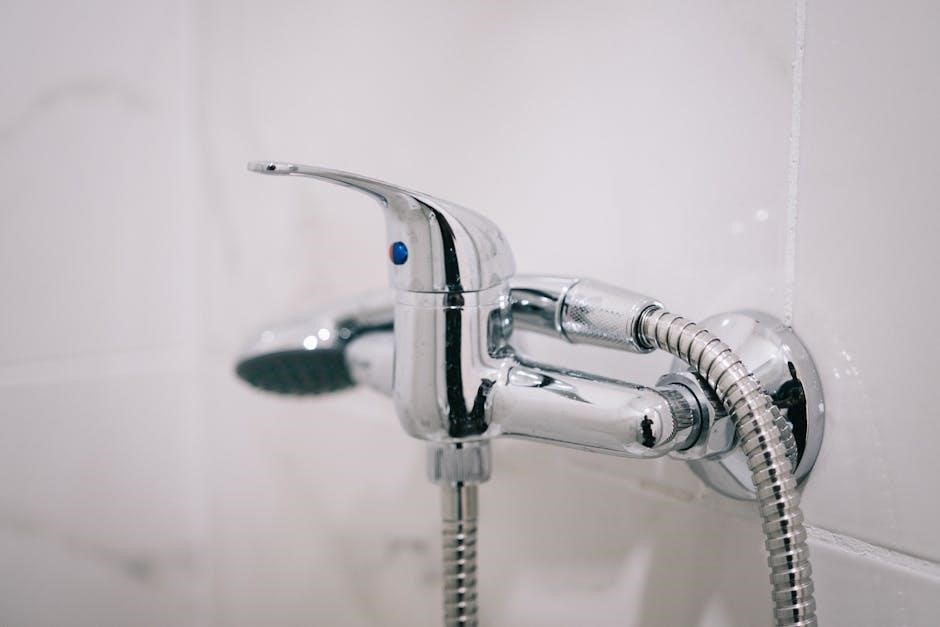
Natural Cleaning Solutions for Shower Drains
Natural solutions like baking soda‚ vinegar‚ and boiling water effectively clear clogs without harsh chemicals. They break down organic matter‚ ensuring a clean and eco-friendly maintenance routine.
Baking Soda and Vinegar: A Natural Cleaning Duo
Baking soda and vinegar are a powerful‚ eco-friendly combination for clearing shower drain clogs. Pour 1 cup of baking soda down the drain‚ followed by 1 cup of distilled white vinegar. The mixture will fizz and bubble‚ breaking down hair‚ soap scum‚ and grease. After 15-20 minutes‚ rinse with boiling water to flush out debris. This natural solution is non-corrosive and safe for pipes‚ making it an ideal method for maintaining a clog-free shower drain without harsh chemicals.
Using Boiling Water to Flush the Drain
Boiling water is a simple yet effective method for flushing out debris and residue in shower drains. After using baking soda and vinegar‚ pour boiling water down the drain to rinse away loosened buildup. This method is eco-friendly and gentle on pipes‚ helping to maintain a clog-free shower drain without damaging the plumbing system. Regular use of boiling water can prevent future blockages and keep your drain flowing smoothly.
Enzymatic Cleaners for Breaking Down Organic Matter
Enzymatic cleaners are a powerful solution for breaking down organic matter in shower drains. These eco-friendly products contain natural enzymes that digest protein-based substances like hair and soap scum. Simply pour the cleaner into the drain and allow it to work over time. This method is ideal for tackling stubborn buildup without harsh chemicals. Regular use helps maintain a clog-free drain by preventing future blockages and keeping the plumbing system clear and functional.
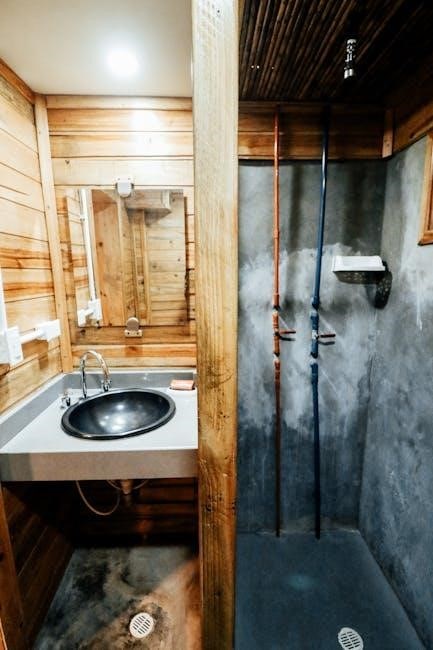
DIY Methods to Unclog a Shower Drain
DIY methods to unclog a shower drain include using a plunger‚ baking soda and vinegar‚ or a drain snake. These tools effectively clear blockages without professional help.
Plunger: The Simplest Tool for Clogs
A plunger is an effective and straightforward tool for clearing minor shower drain clogs. By creating a watertight seal over the drain‚ it uses suction to dislodge blockages. Place the plunger firmly‚ pump it vigorously‚ and lift to remove debris. This method is cost-effective‚ easy to use‚ and ideal for small-scale clogs caused by hair or soap buildup. Regular use can prevent future issues‚ making it a essential DIY solution for maintaining a clog-free shower drain.
Drain Snake: Effective for Stubborn Clogs
A drain snake is a reliable tool for tackling stubborn clogs that a plunger cannot resolve. Its flexible‚ rotating cable navigates deep into pipes to break up or retrieve blockages like tangled hair or grease buildup. Easy to use and versatile‚ a drain snake is ideal for addressing persistent issues without damaging the plumbing. Regular use can prevent severe clogs‚ making it an essential tool for maintaining a clog-free shower drain and ensuring smooth water flow.
Combination of Baking Soda‚ Vinegar‚ and Hot Water
Pour one cup of baking soda down the drain‚ followed by one cup of vinegar. The mixture will fizz‚ breaking down debris and clearing blockages. After 15-20 minutes‚ rinse with boiling water to flush residue. This eco-friendly method effectively tackles organic matter‚ soap scum‚ and grease without harsh chemicals. Regular use helps maintain a clog-free shower drain and promotes smooth water flow‚ ensuring a clean and functional bathroom environment.

Mechanical Tools for Shower Drain Maintenance
Essential tools like plungers‚ drain snakes‚ and plumber’s augers help tackle stubborn clogs. These devices effectively remove debris and restore proper water flow in shower drains.
Plumber’s Auger: A Professional-Grade Solution
A plumber’s auger is a powerful tool designed to tackle severe clogs deep within pipes. Its flexible cable navigates bends‚ effectively breaking up stubborn blockages. Ideal for professional use‚ it’s also accessible to homeowners for maintaining a clog-free shower drain. Regular use helps prevent recurring issues. Always operate it carefully to avoid damaging pipes. This tool is essential for ensuring long-term drain health and reliability.
Drain Brush for Surface Cleaning
A drain brush is a simple yet effective tool for surface cleaning‚ preventing debris buildup. Its soft bristles gently scrub the drain’s interior‚ removing soap scum and hair. Regular use maintains a clean appearance and prevents clogs. It’s an eco-friendly solution that complements other maintenance methods. By incorporating a drain brush into your routine‚ you ensure a clog-free shower drain and promote overall plumbing health.
Pressure Washers for Tough Blockages
Pressure washers are powerful tools for tackling stubborn shower drain clogs. Their high-pressure water jets can break down tough buildup‚ such as grease and debris‚ deep within the pipes. For severe blockages‚ attach a drain-cleaning nozzle to direct the pressure accurately. Always use caution to avoid damaging the pipes or surrounding surfaces. Regular use of a pressure washer can maintain a clog-free drain and prevent future issues.

Regular Maintenance Schedule
Establish a routine with weekly drain checks‚ monthly deep cleaning‚ and quarterly inspections. Use tools like drain snakes and natural cleaners to prevent clogs and odors.
Weekly Checks and Cleaning
Perform weekly inspections to prevent clogs. Remove visible hair from the drain and rinse with warm water. Use a drain strainer or hair catcher to trap debris. Regularly clean the drain surface with mild soap and a soft brush. For deeper maintenance‚ pour 1 cup of baking soda followed by 1 cup of vinegar‚ let it fizz‚ then flush with boiling water. This routine keeps your shower drain flowing smoothly and prevents buildup. Consistency ensures a clog-free system.
Monthly Deep Cleaning Routine
For a monthly deep clean‚ combine 1 cup of baking soda and 1 cup of vinegar. Pour the mixture down the drain‚ let it sit for 15-20 minutes‚ then rinse with boiling water. This breaks down tough buildup and clears minor clogs. Additionally‚ use a drain snake to remove deeper debris. Regular deep cleaning prevents major blockages and keeps your shower drain functioning efficiently‚ ensuring a clog-free experience with minimal effort. Consistency is key to maintaining a healthy plumbing system.
Quarterly Inspections and Preventive Measures
Every three months‚ inspect your shower drain for visible debris or slow drainage. Remove any accumulated hair using a drain brush or tweezers. Check the drain strainer and clean or replace it if necessary. Inspect pipes under the shower for signs of mineral buildup or leaks. Addressing these issues early prevents severe clogs and ensures optimal water flow. Regular inspections and maintenance are crucial for a clog-free shower drain and a hassle-free bathroom experience throughout the year. Consistency in these routines guarantees long-term efficiency and prevents costly repairs.
Identify clogs by slow drainage‚ gurgling sounds‚ or visible debris. These signs indicate potential blockages requiring immediate attention to prevent further damage and maintain efficiency. Regular checks help ensure optimal performance and prevent severe issues from developing. Addressing these signs early ensures a clog-free shower drain and a smooth bathroom experience. Consistent monitoring is key to maintaining a well-functioning drainage system and avoiding costly repairs. Prompt action at the first sign of a problem ensures long-term efficiency and prevents future complications. Slow water drainage is a common sign of a clogged shower drain. It occurs when hair‚ soap scum‚ or grease builds up‚ narrowing the pipe diameter. Water flows slower‚ indicating a partial blockage. Addressing this early prevents complete clogs. Regular cleaning with baking soda and vinegar can help dissolve debris. Using a drain strainer reduces hair accumulation‚ promoting smoother water flow. Prompt action ensures the drain remains efficient and clog-free‚ avoiding costly repairs and maintaining a clean bathroom environment. Consistent maintenance is key to preventing slow drainage issues. Gurgling or unusual noises from the shower drain indicate trapped air or debris. These sounds occur when water struggles to flow past a partial blockage‚ such as hair or soap buildup. Ignoring these signs can lead to complete clogs. Addressing the issue early with natural cleaners like baking soda and vinegar can resolve minor blockages. For persistent noises‚ using a plunger or drain snake may be necessary to clear the obstruction and restore smooth drainage. Regular maintenance helps prevent such issues. Visible debris or hair accumulation in the shower drain is a clear sign of a potential clog. Regularly inspecting and cleaning the drain can prevent buildup. Using a drain strainer or hair catcher is an effective way to trap hair and debris before they enter the pipes. For existing accumulation‚ manually removing visible material or using a brush can help maintain a clog-free drain. Early intervention prevents more severe blockages and ensures optimal water flow. Consistent cleaning habits are key to a well-functioning drain system. Call a professional for severe clogs‚ recurring blockages‚ or complex plumbing issues. They can address deep-rooted problems and prevent further damage to your shower drain system effectively. Severe or recurring clogs indicate deeper issues within your shower drain system. These blockages may result from accumulated debris‚ grease buildup‚ or structural damage. If DIY methods fail to resolve the problem‚ professional intervention becomes necessary. Plumbers possess advanced tools and expertise to identify and eliminate root causes‚ ensuring long-term solutions. Ignoring recurring clogs can lead to further complications‚ such as pipe damage or water backups‚ which can be costly to repair. Addressing these issues promptly is essential for maintaining a clog-free shower drain and overall plumbing health. Complex plumbing issues‚ such as damaged pipes or faulty drainage systems‚ require specialized expertise to resolve. These problems often stem from underlying structural issues rather than surface-level clogs. If you encounter persistent leaks‚ water damage‚ or unusual noises‚ it signals the need for professional assistance. DIY methods may not address the root cause of these issues‚ potentially leading to further damage. Professional plumbers equipped with advanced tools can diagnose and repair complex problems effectively‚ ensuring your shower drain operates smoothly and efficiently for years to come. They handle everything from pipe replacements to system overhauls‚ providing lasting solutions; Damage to the drain or pipes can lead to severe issues‚ including leaks‚ water damage‚ and further clogs. If you notice cracks‚ dents‚ or corrosion in the pipes‚ immediate attention is crucial. Ignoring such damage can result in costly repairs or even system failures. Professional plumbers can assess the extent of the damage and perform necessary repairs or replacements. Regular inspections and maintenance can help prevent such issues‚ ensuring your shower drain remains functional and clog-free for years to come. Addressing damage promptly is essential for maintaining the integrity of your plumbing system. 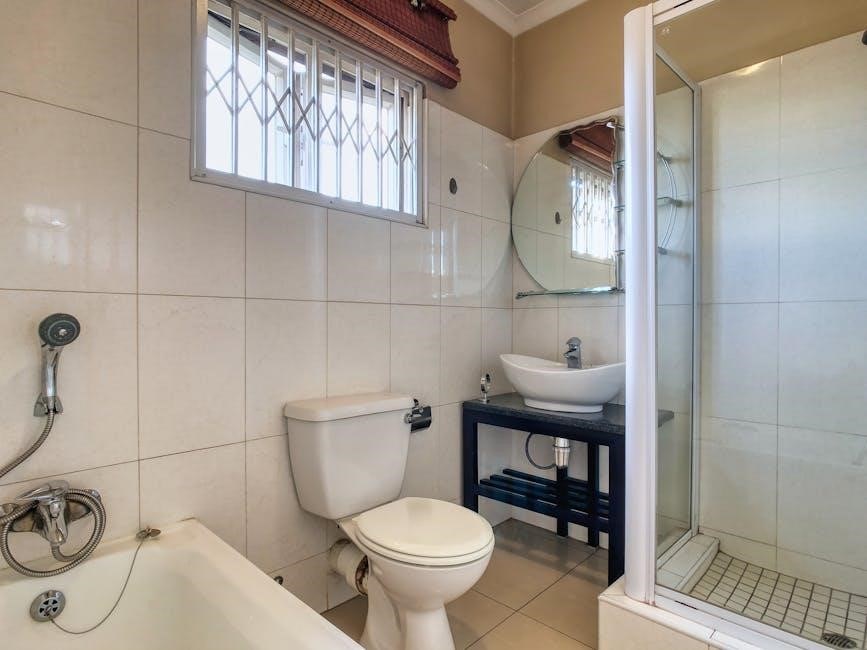
Signs of a Clogged Shower Drain
Slow Water Drainage
Odd Noises or Gurgling Sounds
Visible Debris or Hair Accumulation
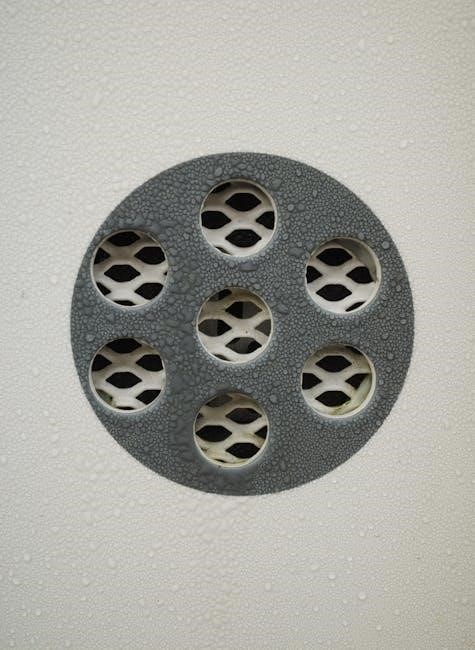
When to Call a Professional
Severe or Recurring Clogs
Complex Plumbing Issues
Damage to the Drain or Pipes
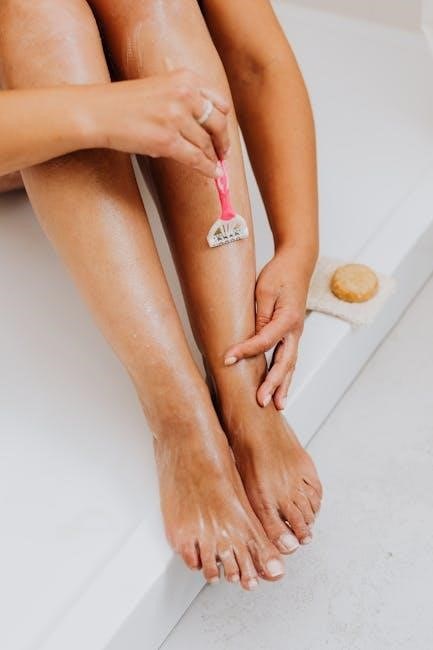



Leave a Reply
You must be logged in to post a comment.